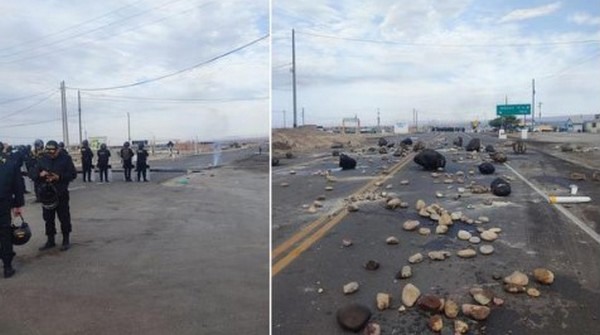The ongoing violent protests in Peru, which have seen the storming of an airport, cancellation of flights to the country, major roadblocks and the death of at least seven people with close to 50 people hospitalised, is starting to have an impact on harvesting, packing and the transport of major export crops of blueberries and table grapes.
In an urgent statement the Association of Agrarian Producers Guilds of Peru (AGAP) said: “Citizens, public and private property suffer serious damage from the demonstrations of vandal groups. We demand that the Government of President Dina Boluarte take immediate action to prevent violent groups infiltrated in the marches from destabilizing the country, attacking public institutions, private companies, the media, blocking free movement on the highways, taking hostages, confronting the forces of order, inciting the population with lies of a political nature and causing painful human losses.”

Picture: AGAP
The protest action, which has been ongoing for months escalated dramatically since last Wednesday after the former president Pedro Castillo was impeached and arrested on 7 December. He announced plans to install an emergency government and dissolve Congress before an impeachment vote. He enjoys wide support amongst rural people. On Monday, Dina Boluarte, his former vice president, who has since become president, gave into the demands of protesters and said in a televised address she will bring general elections forward to April 2024. She also declared a state of emergency in many rural areas.
Over the last six years Peru has had six presidents, while in 2020 it has seen three presidents in one week. The Covid-19 pandemic and how it was handled, the rising price of fertilisers and fuel as well as a recent truckers strike all compound the challenges in this nation that exports fruit to the world.
A blueberry grower in Viru, described the situation on the ground and how it is negatively affecting production: “There’s roadblocks in Viru. It is difficult for labourers to reach the farms. Harvesters can’t come to the field to harvest the blueberries. This week we are reducing the volumes with only around 25% to be packed, due to the lack of labour. The complete industry is affected, there’s no trucks coming in or going out to get the harvest. Packing is also at a near standstill because all the labourers are affected. It started on Monday with nearly no one able to reach the farms. Yesterday (Tuesday) only 50% of the workers could reach the farms by using other roads. They had to pay tolls to the protesters to get through the road blockades.”
“There are other riot events taking place in the South of Peru in Ica and other areas. If it continues like this, it will really affect export this week. I don’t think it will continue much longer. Government will take charge, because there’s a big part of Peru that wants to work. They know there are people with investments. As well as people from villages who are really looking to progress and work hard. They are not in favour of this situation, it is causing them to have less income to take to their homes,” the producer commented.
Another producer who also prefers to remain anonymous commented: “There are some small protests in the North, but without a lot of support from the people. We have not had any effect on our farming operations yet, but I understand that the situation is worse in the South. I’m not sure if the situation in the North will continue in this way, but usually, the worst problems are in the South.”
In their statement AGAP further notes: “We support the democratic process that has allowed the presidential succession provided for in the Constitution and expresses its total agreement that the necessary political reforms be carried out to advance a new general election process that will give it sustainability to Peru.
There were five days of chaos, death and roadblocks in the Centre, North and South of the country that do not allow the free movement of goods and people, severely damaging the agricultural sector and preventing workers from going to their workplaces. Agricultural products are perishable and the population's diet and the livelihood of millions of farmers and workers depend on it. The economic losses are large throughout the agricultural production chain, which are mostly small businesses and family farmers. Jobs are being lost and causing irreparable damage to the entire agricultural sector.
We demand that the Government fulfil its responsibility to the country by defending the rule of law and public order. We demand that you declare a state of emergency, in addition to Apurímac, in Arequipa, Ica, La Libertad, among other regions, giving protection to citizens, public and private property, and re-establishing free traffic on the roads immediately.
We also demand that the Public Ministry and the Judiciary act by giving the necessary support to the Peruvian National Police and Armed Forces to capture and punish the vandal groups that cause anxiety in the country. In addition, Congress must pass a law to give law enforcement legal protection.
The country and the agricultural sector are in a critical situation. Democracy is being threatened. The institutions have to defend it within the framework of the constitution and the law, urgently restoring order, free movement and the rule of law in Peru,” the AGAP statement concluded.
For more information:
Association of Agrarian Producers Guilds of Peru
Email: [email protected]
www.agapperu.org
